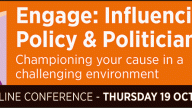Policy, Government and the Voluntary Sector
September Policy Update
Here's what's been going on in the world of policy over the past month.
After a fairly slow August, September felt like the charity sector had suddenly come alive again. In case you missed it, this past month we gained some new guidance on social media and non-party campaigning, a new shadow civil society minister and the sad news that a critical infrastructure organisation will be closing. Here’s some more information:
Labour’s latest reshuffle
As part of the opposition party’s reshuffle, the Labour Party has announced that Lilian Greenwood will be the new Shadow Civil Society Minister. Greenwood has taken over from Barbara Keeley, who has become Shadow Minister for Music and Tourism after 18 months in the civil society position. Additionally, Thangam Debbonaire has been named as the Labour Party’s shadow Secretary of State for Culture, Media and Sport.
Awaited social media guidance has been published
The Charity Commission has released its new guidance on social media after gaining feedback from its April Consultation. The new and improved guidance offers lots of helpful information and resources for charities on forming a social media policy, campaigning and monitoring risk. After receiving backlash during the consultation process, the Commission has listened to the sector’s advice and produced a piece of guidance that will be of value to trustees, CEOs and staff. At DSC, we’re pleased to see that the Commission has followed our advice by including a collection of resources and providing more information on topics such as campaigning and when to monitor trustees personal accounts. View the new guidance here.
Vital infrastructure organisation closes amid financial challenges
After 81 years of providing support to the children’s sector, the infrastructure organisation Children England has announced that it will be closing at the end of the year due to financial challenges. After government funding was cut in 2013, for the past 10 years Children England have been strategically trying to stay afloat, however, they can no longer continue the vital work that they do to support children across the UK. This is sad news for the team at DSC as we have worked side by side on many campaigns over the years, including the Grants for Good campaign which is working to promote government grants for charities and voluntary groups. Read their press release here.
New draft guidance on non-party campaigning
The Electoral Commission (EC) has released a draft statutory guidance on non-party campaigning. The draft has already been through a consultation process and is set to be published in the next few weeks after it has been reviewed by parliament. It is unlikely that the guidance will change very much after its review, however, so far it has the potential to provide more clarity to the charity sector, especially regarding information on joint campaigning laws. The draft has confirmed that as long as there’s no financial commitment, i.e. you’re signing a joint letter or endorsing another campaign, it won’t count as ‘joint campaigning’ and therefore you will not have to register with the Electoral Commission as a non-party campaigner. The EC has provided a load of examples of what joint campaigning is and what it isn’t, so take a look and get to know the information. Take a look at the draft guidance here.
£76m Cost of Living fund opens to applications – closing Monday 16 October
Having launched back in July, the Community Organisations Cost of Living Fund (CCLF), which includes a total of £76m, is still open to applications. Charities and community groups struggling to provide critical frontline services are able to apply for anything between £10,000 and £75,000.
Delivered in partnership with The National Lottery Community Fund, the CCLF aims to support organisations across England to provide critical frontline services. Organisations can apply for funding to maintain or expand essential cost-of-living services until the end of March 2024.
Applicants to CCLF must be:
- offering critical services to low-income households and individuals around at least one of food and emergency supplies, emergency shelter, safe spaces, warmth and financial or housing advice;
- able to demonstrate increased demand and increased costs for those critical services
- registered with the Charity Commission or an incorporated not-for-profit company;
- providing services to a local community in England – with a focus on small and medium organisations, although national organisations can apply where they can demonstrate local impact.
Find out more about the CCLF’s eligibility criteria here.
Important dates for your diary
Party conferences are underway and it’s starting to feel a bit more like we’re warming up to the General Election campaign. Some other dates to look out for this Autumn:
- 7 November – King’s Speech – the Government will set out its legislative agenda for the rest of this Parliament
- 22 November – Autumn Statement – the Chancellor of the Exchequer will give an update on the nation’s finances and key policy proposals
Stay tuned to the DSC Daily Bulletin for updates and analysis on these policy issues and more.



